Web Development Vs App Development: Which is a Better Career Choice?
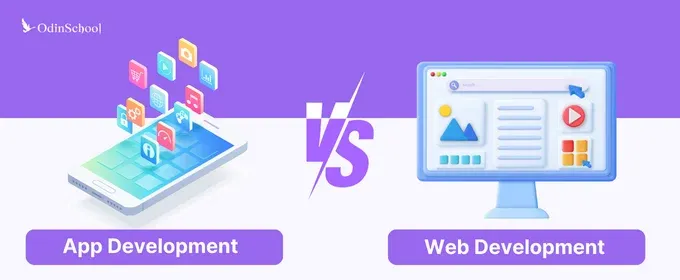
Organizations seek effective ways to establish their online presence, engage users, and deliver seamless experiences as the digital landscape evolves.
Web and App Development Stats You Should Know in 2024
Success Stories: Businesses Thriving on Web and App Development
Web and app development have revolutionized the business landscape, empowering companies to reach wider audiences, streamline operations, and create engaging customer experiences.
Here are some inspiring examples of businesses that have successfully leveraged these technologies:
Web Development
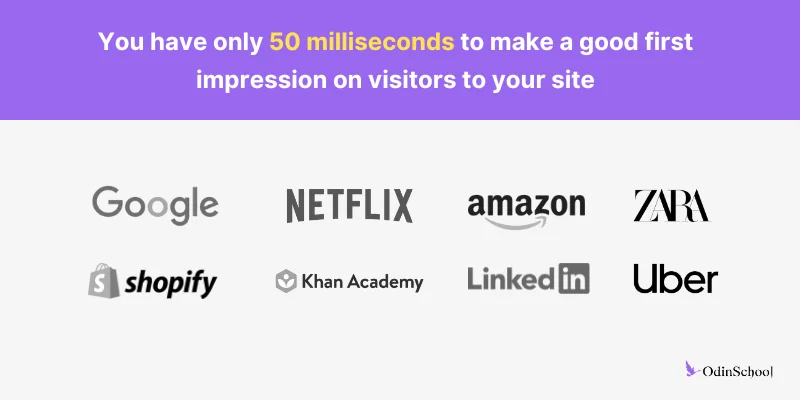
-
Google: It has emerged as a transformative force, reshaping the way we access information and connect with the world
-
Uber: The seamless web and app booking system disrupted the taxi industry, offering convenient and affordable rides at the touch of a button.
-
Netflix: Their intuitive web platform and mobile apps transformed movie and TV show streaming, creating a global entertainment powerhouse.
-
Shopify: This e-commerce platform empowers entrepreneurs to build and manage online stores, democratizing online commerce easily.
-
Khan Academy: This free educational website and app offers high-quality educational content to anyone, anywhere, bridging the educational gap globally.
-
Amazon: Mastered online shopping with a vast selection, personalized recommendations, and convenient delivery.
-
Zara: Blended online and offline with click-and-collect, in-store reservations, and loyalty rewards
App Development
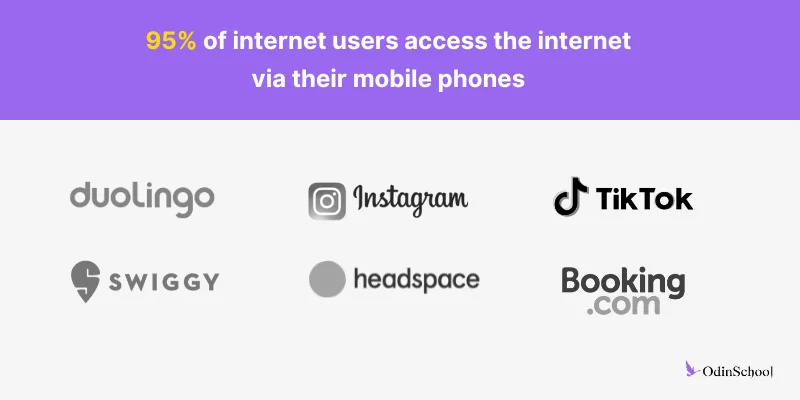
-
Duolingo: Their gamified language learning app made learning languages fun and accessible, attracting millions of users worldwide.
-
Instagram: This photo and video-sharing app redefined social media, changing how people connect and share experiences.
-
TikTok: This short-form video app took the world by storm, creating a platform for creative expression and fostering viral trends.
-
Swiggy: This food delivery app transformed the restaurant industry, offering convenient food ordering and delivery services.
-
Booking.com aggregates millions of hotels and accommodations worldwide on its website and app, making travel planning and booking seamless.
-
Headspace: Popularized mindfulness and meditation through their app, offering guided meditations, sleep routines, and stress-management tools.
The above examples highlight the diverse ways businesses can leverage web and app development.
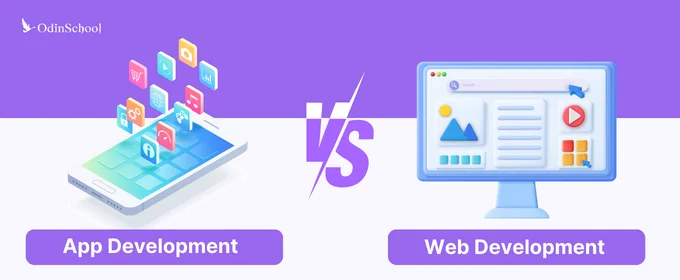
Key Differences: Web Development Vs App Development
Here are some key differences that you ought to know among both of them,
| Feature | Web Development | App Development |
|---|---|---|
| Platform Independence | Can be accessed via web browsers on any device. | Native apps are developed for specific platforms (iOS, Android) and offer platform-specific experiences. |
| Development Tools and Technologies | HTML, CSS, JavaScript, and web frameworks (React, Angular, Vue.js). | Platform-specific languages and tools (Swift, Kotlin for mobile apps). |
| Cost-Effectiveness | Generally, it is more cost-effective with a single codebase for various devices. | May involve higher costs due to development for multiple platforms (iOS, Android). |
| Ease of Maintenance | Updates and changes can be deployed instantly across all devices. | App updates need to be submitted and approved through app stores. Users must download updates. |
| Enhanced Performance | Generally offers good performance but may be limited compared to native apps. | Native apps often perform better and utilize device-specific features for a seamless experience. |
| Access to Device Features | Limited access to device features compared to native apps. | Direct access to device features like camera, GPS, and contacts, enhancing functionality and user experience. |
| App Store Distribution | Not applicable. Web applications are accessed through browsers. | Distribution through app stores provides exposure to a large user base with streamlined updates and deployment. |
Career Scope: Web Development Vs App Development
Choosing between web development and app development can be a daunting task. Both paths offer exciting opportunities in the ever-evolving digital world, but understanding their nuances and career prospects can help you make an informed decision.
Let's dive into the career scope of each field:
Web Development
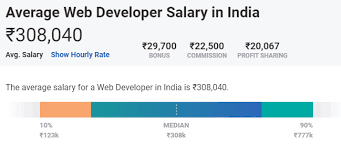
source: payscale
-
Focus: Creating and maintaining websites and web applications accessible through any device with an internet connection.
-
Skills: HTML, CSS, JavaScript, PHP, Python, databases, web frameworks like React and Angular, UI/UX design principles.
-
Career Paths: Front-end developer, back-end developer, full-stack developer, web designer, web content developer, web performance optimizer and many more.
- Pros: High demand, diverse career options, constant innovation, platform-agnostic (works on any device), and potential for remote work.
-
Cons: Competitive field, complex projects, rapid technology changes, need for strong problem-solving and debugging skills.
App Development
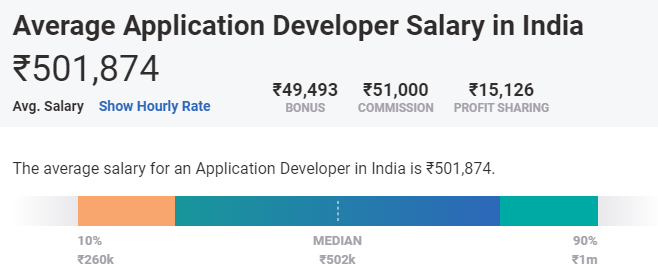
source: payscale
-
Focus: Creating and maintaining mobile applications for specific platforms like iOS or Android.
-
Skills: Java (Android), Kotlin (Android), Swift (iOS), Objective-C (iOS), platform-specific SDKs, and mobile app development frameworks like Flutter and React Native.
-
Career Paths: iOS developer, Android developer, hybrid app developer, mobile UI/UX designer, mobile game developer, mobile security specialist and many more.
-
Pros: High demand, lucrative salaries, potential for building engaging and interactive experiences, and specialization in specific platforms can be advantageous.
-
Cons: Fragmented market (different platforms require different skills), platform dependence (limited to specific devices), rapid technology changes, and potentially higher development costs than web apps.
Choosing the Right Path
There is no definitive answer to which path is "better." Both web and app development offer exciting and rewarding careers with strong growth potential. The key is understanding your strengths, interests, and goals and choosing the path that best aligns with your vision for the future.
Consider these factors when choosing one,
-
Technical Skills: Are you comfortable with programming languages and frameworks? Do you prefer working with front-end or back-end technologies?
-
Platform Preference: Do you want to build apps for specific platforms like iOS or Android, or do you prefer platform-agnostic web development?
-
Career Goals: Do you seek diverse career options or prefer specializing in a specific platform/technology? Do you value remote work opportunities?
-
Personal Interests: Are you drawn to the creative aspects of UI/UX design or the technical challenges of back-end development?
Remember, both fields offer competitive salaries and are in high demand, but salaries can vary based on experience, location, and specific skills. Both fields are expected to experience significant growth in the coming years, driven by the increasing reliance on digital technologies.
Unlock Your Potential
Embark on a transformative journey with OdinSchool's Web Development Course, designed to equip you with the skills needed to thrive in the world of web development. Whether you're a beginner or an experienced coder, this course offers a structured curriculum and popular web frameworks.
Why Choose OdinSchool?
-
Industry-Relevant Skills: The curriculum is crafted in collaboration with industry experts, aligning with the latest industry trends and demands. Students graduate with theoretical knowledge and skills that resonate with the ever-evolving needs of the tech landscape.
-
Career Services: As students traverse the OdinSchool Odyssey, dedicated career guidance resources empower them to navigate the job market successfully. From resume building to interview preparation, OdinSchool is committed to the holistic development of its students.
-
Success Stories: Here are some of the success stories from OdinSchool that inspire you. This one stands out: Tech Motivation: Jitendra Kumar's Inspirational Journey Unveiled.
Frequently Asked Questions (FAQ)
![]()
Which is better, web development or app development?
Both fields offer exciting opportunities and challenges, and ultimately, the "best" path for you is the one that aligns best with your own career priorities.
What pays more, web development or app development?
The salary for web development and app development can vary based on location, experience, skills and the specific industry or company. However, it is observed that mobile app developers are paid more.
What should I learn first, web development or app development?
Learning web development first will provide a strong foundation for various concepts that can be applied later to app development.
Which is easier, app dev or web dev?
It's difficult to say which is easier, as it depends on your prior knowledge, learning style, and personal preferences. But the learning curve can get structured and easier, provided you join an industry-vetted web development course.
Which is more in demand, web dev or app dev?
Both web development and app development are in high demand as businesses aim to establish a strong online presence using user-friendly websites and apps.
What is the most commonly utilized technology for web development?
JavaScript, the web's dominant language, powers most web pages and client-side web applications. And, React, a powerful JavaScript library, has become a leading choice powering many modern web pages and applications.
Do tech giants like Google hire web or app developers?
Yes, tech giants like Google definitely hire both web and app developers! In fact, they have significant teams dedicated to web and app development, working on a wide range of projects and products.
Can non-IT become a web developer?
Yes, individuals with non-IT backgrounds can become web developers. While having a background in computer science or related fields can be advantageous, it's not a strict requirement.
{% module_block module "widget_bd727f11-8a04-42f2-ac6f-bd3bca7d0cb5" %}{% module_attribute "child_css" is_json="true" %}{% raw %}{}{% endraw %}{% end_module_attribute %}{% module_attribute "css" is_json="true" %}{% raw %}{}{% endraw %}{% end_module_attribute %}{% module_attribute "definition_id" is_json="true" %}{% raw %}null{% endraw %}{% end_module_attribute %}{% module_attribute "field_types" is_json="true" %}{% raw %}{"link":"text","text":"text"}{% endraw %}{% end_module_attribute %}{% module_attribute "label" is_json="true" %}{% raw %}null{% endraw %}{% end_module_attribute %}{% module_attribute "link" is_json="true" %}{% raw %}"https://www.odinschool.com/blog/breaking-the-mold-employers-think-bootcamp-grads-are-just-as-prepared"{% endraw %}{% end_module_attribute %}{% module_attribute "module_id" is_json="true" %}{% raw %}135590387735{% endraw %}{% end_module_attribute %}{% module_attribute "path" is_json="true" %}{% raw %}"/OdinSchool_V3/modules/Blog/blog - source links"{% endraw %}{% end_module_attribute %}{% module_attribute "schema_version" is_json="true" %}{% raw %}2{% endraw %}{% end_module_attribute %}{% module_attribute "smart_objects" is_json="true" %}{% raw %}null{% endraw %}{% end_module_attribute %}{% module_attribute "smart_type" is_json="true" %}{% raw %}"NOT_SMART"{% endraw %}{% end_module_attribute %}{% module_attribute "tag" is_json="true" %}{% raw %}"module"{% endraw %}{% end_module_attribute %}{% module_attribute "text" is_json="true" %}{% raw %}"Employers Think Bootcamp Grads are “Just as Prepared”"{% endraw %}{% end_module_attribute %}{% module_attribute "type" is_json="true" %}{% raw %}"module"{% endraw %}{% end_module_attribute %}{% module_attribute "wrap_field_tag" is_json="true" %}{% raw %}"div"{% endraw %}{% end_module_attribute %}{% end_module_block %}
Can AI replace web developers?
While AI might automate some tasks, it won't replace the need for skilled web developers. Those who adapt, embrace new technologies and focus on their unique human strengths will continue to shape the future of the web.